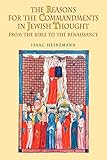The Reasons for the Commandments in Jewish Thought : From the Bible to the Renaissance / Isaac Heinemann.
Material type: TextSeries: Reference Library of Jewish Intellectual HistoryPublisher: Boston, MA : Academic Studies Press, [2008]Copyright date: ©2008Description: 1 online resource (240 p.)Content type:
TextSeries: Reference Library of Jewish Intellectual HistoryPublisher: Boston, MA : Academic Studies Press, [2008]Copyright date: ©2008Description: 1 online resource (240 p.)Content type: - 9781934843536
- 9781618111005
- online - DeGruyter
| Item type | Current library | Call number | URL | Status | Notes | Barcode | |
|---|---|---|---|---|---|---|---|
 eBook
eBook
|
Biblioteca "Angelicum" Pont. Univ. S.Tommaso d'Aquino Nuvola online | online - DeGruyter (Browse shelf(Opens below)) | Online access | Not for loan (Accesso limitato) | Accesso per gli utenti autorizzati / Access for authorized users | (dgr)9781618111005 |
Browsing Biblioteca "Angelicum" Pont. Univ. S.Tommaso d'Aquino shelves, Shelving location: Nuvola online Close shelf browser (Hides shelf browser)

|

|

|

|

|

|

|
||
| online - DeGruyter Religious Zionism : History and Ideology / | online - DeGruyter The Wisdom of Love : Man, Woman and God in Jewish Canonical Literature / | online - DeGruyter The Horizontal Society : Understanding the Covenant and Alphabetic Judaism (Vol. I and II) / | online - DeGruyter The Reasons for the Commandments in Jewish Thought : From the Bible to the Renaissance / | online - DeGruyter Theological and Philosophical Premises of Judaism / | online - DeGruyter Strictly Kosher Reading : Popular Literature and the Condition of Contemporary Orthodoxy / | online - DeGruyter Mysticism in Twentieth-Century Hebrew Literature / |
Frontmatter -- Contents -- The Reason for the Mitzvot -- Author’s Preface to First Edition (1942) -- Translator’s Preface -- Chapter 1. The Nature of the Question -- Chapter 2. The Biblical View -- Chapter 3. The Views of the Rabbis -- Chapter 4. The Views of the Hellenistic Jews -- Chapter 5. Views of the Medieval Philosophers -- Chapter 6. Saadia Gaon -- Chapter 7. Baḥya ben Joseph Ibn Pakudah -- Chapter 8. Rabbi Judah Halevi -- Chapter 9. Abraham Ibn Ezra -- Chapter 10. Abraham Ibn Daud -- Chapter 11. Maimonides -- Chapter 12. Gersonides -- Chapter 13. Ḥasdai Crescas -- Chapter 14. Joseph Albo -- Chapter 15. Don Isaac Abravanel -- Chapter 16. Summary of the Medieval Thinkers -- Chapter 17. Principal Conclusions -- Abbreviations -- Notes -- Glossary -- Index
restricted access online access with authorization star
http://purl.org/coar/access_right/c_16ec
This classic work by early-20th-century Jewish humanist and scholar Isaac Heinemann surveys the crucial phases of Jewish thought concerning correct conduct as codified in the commandments. Heinemann provides his own systematic insights about the intellectual, emotional, pedagogical, and pragmatic reasoning advanced by the major Jewish thinkers. This volume covers Jewish thinkers from the Bible, rabbis and Hellenistic philosophers through the Middle Ages and the Renaissance, including Saadiah, Halevi, Maimonides, Albo, and many others. Heinemann addresses such questions as: "What were the Biblical, rabbinic, medieval, and modern rationales offered for the commandments in the course of Jewish thought?"
Mode of access: Internet via World Wide Web.
In English.
Description based on online resource; title from PDF title page (publisher's Web site, viewed 01. Dez 2022)


